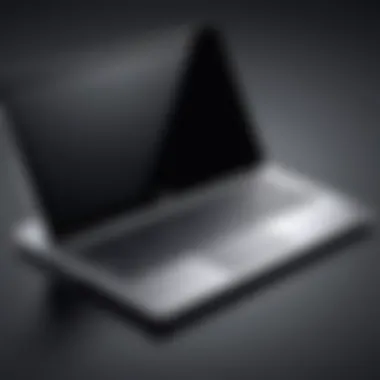In-Depth Review of Dell Tablet Laptops for Professionals


Intro
As technology continues to evolve, the blend of mobility and functionality becomes increasingly crucial. Dell has embraced this need with its tablet laptops, offering devices that provide the versatility of a tablet paired with the capabilities of a laptop. This article dissects Dell's offerings, outlining their key features, performance, and potential user scenarios. Understanding these aspects helps IT professionals and tech enthusiasts navigate the complex landscape of computing devices.
Product Overview
Dell's tablet laptops cater to a diverse demographic, from students to business professionals and creative individuals. Their design emphasizes portability without sacrificing power. The range includes models that are both cost-effective and high-end, appealing to a wide variety of budgets and preferences.
Key Features
- Touchscreen Display: Dell tablet laptops typically feature high-resolution displays with responsive touch capabilities, enhancing user interaction and multimedia experience.
- 2-in-1 Design: Many models function as both a laptop and a tablet, providing flexibility for various tasks, such as note-taking, drawing, and document editing.
- Robust Build Quality: These devices often come with durable materials, ensuring reliability for users who are frequently on the move.
- Stylus Support: Some models include support for stylus input, catering to creative professionals who require precision in their work.
Technical Specifications
Dell offers a variety of specifications across different models. Key specifications typically include:
- Processors: Ranging from Intel Core i3 to i7, ensuring suitable performance for both light tasks and resource-heavy applications.
- RAM: Options usually vary from 4GB to 16GB, allowing users to select according to their multitasking needs.
- Storage: SSD options are common, enhancing speed and responsiveness.
- Battery Life: Most models aim for a battery life of up to 10 hours, promoting productivity without frequent recharging.
Performance Analysis
To assess the performance of Dell's tablet laptops, both synthetic benchmarks and real-world usage scenarios are invaluable.
Benchmark Test Results
In benchmark tests, Dell tablet laptops often demonstrate competitive results when compared to other brands. For instance, performance tests may show that devices with Intel Core i5 processors are capable of handling everyday tasks with ease, while higher-end models perform well under demanding workloads.
Real-World Usage Scenarios
Real-world usage highlights the versatility of Dell tablet laptops. For example:
- Business Professionals: These users often appreciate the portable design for presentations, video conferencing, and light office work.
- Students: Many find the tablet option beneficial for note-taking during lectures and easily accessing digital textbooks.
- Creatives: Artists and designers may leverage the stylus support for precise work while utilizing the touchscreen for interactive applications.
"Dell's tablet laptops blend the line between productivity and enjoyment, making them suitable for various applications across demographics."
In summary, this analysis aims to shed light on Dell's tablet laptop offerings by examining their features, specifications, and performance in different scenarios. Through this detailed examination, IT professionals and tech enthusiasts can make informed choices that align with their specific needs.
Prelims to Dell Tablet Laptops
In the realm of portable computers, Dell has established itself as a trusted name. The introduction of tablet laptops marks a significant evolution in how users interact with technology, allowing for greater versatility and convenience. This segment will cover the relevance of Dell's tablet laptops in today’s ever-evolving digital landscape.
Tablet laptops blend the functionality of a traditional laptop with the portability and touch interface of a tablet. For many professionals and tech enthusiasts, this hybrid model represents an optimal solution, providing powerful computing capabilities without sacrificing mobility. Users can engage in casual tasks or professional activities swiftly, adapting devices to their needs seamlessly.
Dell's commitment to quality and innovation is evident in its tablet laptops. The focus on user needs—such as performance, battery life, and display quality—has positioned Dell well within a competitive market. Potential users must consider how these devices can enhance productivity in various domains, including business, education, and personal use.
"Choosing the right tablet laptop is crucial for optimizing work efficiency and personal satisfaction."
With this article, we aim to explore Dell's offerings in depth. Each aspect, from technological specifications to user experiences, will be examined. The goal is to provide insights that empower IT professionals and tech enthusiasts to make informed decisions about their next device.
In summary, understanding the significance of Dell’s tablet laptops is essential as they adapt to contemporary user requirements. Engaging with this content will prepare readers for the exploration of features, performance metrics, and future trends shaping this product category.
Overview of Tablet Laptop Technology
The importance of understanding tablet laptop technology cannot be overstated in today's digital landscape. Tablet laptops bridge the gap between traditional laptops and tablets, offering a diverse range of functionalities. This section will explore the definition and evolution of this technology, alongside current market demand and existing trends.
Definition and Evolution


Tablet laptop technology refers to hybrid devices capable of functioning both as a laptop and a tablet. Typically, they feature a touchscreen interface, detachable keyboards, and the ability to run full desktop operating system like Windows or macOS. While the concept isn’t new, the advancements over the years have significantly improved their capabilities and user experiences. Originally, these devices were clunky and had limited performance. However, with the introduction of powerful processors, enhanced graphics, and longer battery life, they have gained popularity among various user demographics. As this technology evolved, we witnessed a shift towards more sleek and portable designs which cater to mobile professionals and education sectors alike.
Market Demand and Trends
The demand for tablet laptops has seen a notable spike as remote work trends become ubiquitous. Users seek devices that provide flexibility without losing functionality. Key trends include a focus on portability, performance, and usability. Users prioritize devices that allow them to shift seamlessly between work and personal tasks. Additionally, the rise of cloud computing has fostered a culture of collaboration and productivity that tablet laptops can support effectively. Market analysts predict that as more educational institutions explore digital learning tools, the demand for tablet laptops will continue to rise. Thus, understanding these factors is essential for companies like Dell to refine their offerings and meet consumer expectations effectively.
"Tablet laptops are becoming essential tools for both productivity and leisure, demonstrating their versatility in modern computing environments."
By comprehensively analyzing the evolution and market dynamics of tablet laptop technology, readers can grasp the significance of these devices, as they form an integral part of the current technological framework.
Dell's Position in the Tablet Laptop Market
Dell's positioning within the tablet laptop market is pivotal for understanding its relevance and competitiveness. This section discusses how Dell has carved out a space in the rapidly evolving landscape of tablet laptops. With a focus on technological advancements, user needs, and market trends, Dell continues to differentiate itself by offering robust devices that meet diverse demands.
Brand History and Reputation
Dell's journey in the technology sector began in 1984, when it was founded by Michael Dell. Over the decades, the brand has established a reputation for reliability and customer service. This reputation is crucial in the tablet laptop segment, as potential buyers often seek trusted brands that provide consistent performance and quality support. The shift towards mobile computing has prompted Dell to innovate continuously. It has addressed market changes by focusing on user feedback and adopting advanced technologies.
In recent years, Dell has received accolades for its commitment to environmental sustainability and ethical practices. This reputation enhances its appeal, particularly among eco-conscious consumers and businesses. The Dell brand has become synonymous with dependable devices that function well for professional and personal use alike.
Product Lineup Overview
Dell offers a range of tablet laptops that cater to varying user requirements. The Latitude series targets business professionals with features like security options, manageability, and versatile performance. The XPS line, known for its sleek design and high-resolution displays, appeals to creative professionals and general consumers alike.
In contrast, the Inspiron series provides budget-friendly options while maintaining acceptable performance levels for everyday tasks. Each product line is designed to enhance user experience, focusing on aspects like durability, portability, and functionality.
The presence of multiple series allows Dell to reach a broader audience. Users can choose models based on their preferred operating system, form factor, and intended use.
- Latitude series: Business-centric, robust security features
- XPS series: High performance, aesthetic design for creatives
- Inspiron series: Affordable, suitable for personal use
Dell's product strategy reflects its understanding of the market dynamics and demographic needs. As a result, it continues to maintain a strong foothold in the tablet laptop arena.
Key Features of Dell Tablet Laptops
The key features of Dell tablet laptops play a crucial role in their overall performance and user satisfaction. These features directly affect usability, versatility, and practicality for a range of applications. By understanding what Dell offers, buyers can make informed decisions, aligning their requirements with Dell’s capabilities. Features such as display quality, processing power, battery life, and operating systems are essential to evaluate.
Display Quality and Size Options
Display quality in Dell tablet laptops is a fundamental aspect of the user experience. High-resolution screens enhance clarity and vibrancy, making them suitable for graphic design, presentations, and multimedia consumption. Options range from Full HD to UHD displays, catering to professional-grade requirements.
In addition to quality, size options also contribute significantly to functionality. Dell offers various sizes, from compact 11-inch models for portability to larger 15-inch screens which benefit tasks that require more screen real estate. Users must consider their intended usage to determine the best option for their needs.
Processor and Performance Analysis
Processor capability is vital for any tablet laptop. Dell equips their devices with a range of processors, including Intel's latest i-series. These processors cater to diverse needs, whether simple browsing or demanding software applications.
Performance can be measured through benchmarking, where Dell laptops often show impressive scores, particularly in multitasking scenarios. This efficiency allows seamless transitions between applications, which is essential for productivity in professional environments.
Battery Life and Power Management
Battery life is a significant concern for users, especially for those who rely on their devices for extended periods. Dell tablet laptops are designed with efficient power management systems that extend overall battery life. Many models offer eight to ten hours of usage, allowing users to work without constant recharging.
However, battery duration can fluctuate based on the configuration and usage patterns. For instance, a high-performance mode may lead to quicker power depletion. Thus, users should be aware of their needs and consider balancing performance and longevity.
Operating System and Software Ecosystem
Dell tablet laptops typically operate on Windows, providing a familiar interface for most users. This operating system supports a plethora of applications suitable for various professional tasks. Users also have options with different versions, such as Windows 10 or Windows 11, each offering unique features and improvements.


Moreover, compatibility with a wide software ecosystem enhances usability. Applications like Microsoft Office, Adobe Creative Suite, and a range of productivity tools can seamlessly integrate, making these devices versatile for business and educational purposes. Users are encouraged to evaluate their required software ecosystem to ensure compatibility with their Dell tablet laptop.
"Understanding the key features of Dell tablet laptops can significantly impact user satisfaction and device usability."
In summary, the key features of Dell tablet laptops encompass essential aspects like display quality, processing capabilities, battery endurance, and operating systems. Each element contributes to the overall user experience, making it crucial for potential buyers to consider these factors when making their selection.
Comparative Analysis: Dell vs Competitors
A comparative analysis of Dell's tablet laptops against those of its competitors is essential to understand the market landscape for consumers and professionals alike. By evaluating Dell against brands like Microsoft, HP, and Lenovo, we gain insight into relative strengths and weaknesses. This knowledge can shape purchasing decisions, ensuring buyers select the device that best meets their needs. Key considerations include performance metrics, build quality, price, and user experiences.
Comparison with Microsoft Surface
Microsoft Surface devices have been a significant player in the tablet laptop market. Compare Dell's offerings to Surface models reveals critical differences in design and functionality. The Surface series often emphasizes premium materials and form factor, appealing to users who prioritize aesthetics and performance in an ultra-portable package.
Dell's tablet laptops typically offer a more utilitarian approach, focusing on durability and value for money. The performance in graphics-intensive tasks may lean slightly in favor of the Surface when equipped with higher configurations. Conversely, Dell's advantage often resides in its extensive support and warranty offerings, which can be crucial for business users. This results in a solid argument for selecting Dell's devices based on long-term reliability and post-purchase support.
Comparison with HP Tablets
HP has consistently produced a range of tablet laptops that cater to both business and educational sectors. The HP Spectre series is known for its sleek design and excellent display quality, rivaling Dell's XPS line. Dell's keyboards tend to receive better reviews regarding tactile feedback and ergonomics compared to HP’s detachable options. Furthermore, HP tablets sometimes come at a higher price point with limited specifications compared to Dell's lineup.
Ultimately, users who prioritize a good keyboard experience might lean toward Dell, while those looking for stylish aesthetics might find HP appealing. Each brand has its niche, and understanding these differences can guide users in making an informed decision.
Comparison with Lenovo Alternatives
When assessing Lenovo's tablet laptops, particularly the Yoga series, there is a notable focus on versatility and innovative design. Lenovo often utilizes touchscreens and 360-degree hinges that enhance usability across various settings. Dell, while also versatile, maintains a traditional clamshell design for many models, which might appeal to conservative users who prefer a straightforward laptop experience.
Performance-wise, both brands equip their devices with capable processors. However, Lenovo frequently offers models with slightly better battery life in specific conditions. Users needing elongated use without constant recharging may see Lenovo as a preferable option.
User Experiences and Testimonials
User experiences and testimonials are crucial in understanding Dell's tablet laptops. They offer practical insights that go beyond specifications and features. Users provide feedback on real-world applications, revealing how well the technology performs in daily use. This aspect of the analysis can help potential buyers make informed decisions, as user testimonials can highlight strengths and weaknesses that manufacturers might not emphasize.
Professional Use Cases and Performance
In a professional setting, Dell tablet laptops are often deployed for tasks that require mobility and efficiency. For example, consultants and business travelers appreciate the lightweight design and the ability to run powerful applications.
One user noted, "I use my Dell tablet for presentations and data analysis. The screen size is perfect for sharing with clients, and it runs software like Microsoft Excel without any lag. Efficiency is key in my work, and this device helps me achieve that."
Such testimonials underline the importance of performance and versatility in laptops used within the corporate environment.
Educational Sector Feedback
In the education sector, Dell tablet laptops have received mixed feedback. Many students value their devices for note-taking and accessing digital textbooks. However, some teachers express concern over battery life during long classes. A student mentioned, "I find the tablet great for taking notes, but I have to charge it during long days or else it dies on me."
This feedback highlights the need for improvements in power management, particularly for academic settings where students expect reliability throughout the day.
Personal Use Insights
For personal use, individuals often select Dell tablets for casual web browsing, streaming, and light gaming. Users enjoy the responsive touch screens and the integrated software. However, some users also mention they find the design a bit bulky compared to other tablets available. One user shared, "The tablet is excellent for my Netflix binge sessions, but I wish it was a tad slimmer for better portability."
Such comments reflect diverse user preferences and priorities, affecting how Dell markets its products.
Overall, evaluating user experiences and testimonials offers a well-rounded view of Dell's tablet laptops. They reveal how these devices fit into various lifestyles and daily tasks, effectively aiding prospective buyers in their choices.
Potential Drawbacks of Dell Tablet Laptops


Understanding the potential drawbacks of Dell tablet laptops is crucial for anyone considering an investment in this technology. While these devices offer many benefits, acknowledging the limitations can help users make better-informed decisions. Issues can stem from various elements such as performance, usability, and pricing that may not align with all users' expectations or needs.
Common Issues Faced by Users
One of the foremost concerns users have reported with Dell tablet laptops involves performance issues. Although Dell aims to deliver devices with adequate specifications for daily tasks, some users find that certain models do not cope as well under heavier loads, such as graphic designing or intensive multitasking. This can lead to lagging or unexpected shutdowns, causing frustration for users who require consistent performance.
Another concern is related to connectivity. Users have sometimes experienced challenges with Wi-Fi and Bluetooth connections in specific models. Connectivity issues can be a significant hindrance, especially in a work environment or academic setting where seamless online access is critical.
A further issue includes heating problems. When operating for extended periods or during high-demand tasks, some models can generate significant heat, leading to discomfort and, in rare cases, performance throttling.
Price Point Concerns
Price is a notable consideration for potential buyers of Dell tablet laptops. Many models in the Dell lineup are positioned at a higher price point. Some users feel that the cost does not always directly correlate with performance. Given the fierce competition in the tablet laptop market, this can cause hesitation among potential buyers who may find more favorable specifications at a similar or lower price from competitors like Microsoft or Lenovo.
Additionally, the value for money perception can be influenced by the availability of alternatives with similar features at a lower cost. Users seeking affordable yet equally functional devices may be drawn to options that prioritize budget considerations.
"Before purchasing a Dell tablet laptop, one must weigh the potential drawbacks against their specific needs and preferences."
Future Trends in Tablet Laptop Technology
Understanding future trends in tablet laptop technology is crucial for IT professionals and tech enthusiasts. This section examines the implications of evolving technologies and emerging market patterns. Staying informed on these trends helps users anticipate and adopt innovations that can enhance productivity and overall user experience.
Emerging Technologies and Innovations
Emerging technologies are pivotal in shaping the future landscape of tablet laptops. Notable advancements include:
- Artificial Intelligence (AI): AI applications are integrated within tablet laptops to improve processing efficiency. This technology can anticipate user needs, optimizing performance in various tasks.
- Enhanced Display Technology: Manufacturers are focusing on higher resolution screens and better color accuracy. OLED and mini-LED technologies are examples that deliver sharper images and better viewing experiences.
- 5G Connectivity: With the rise of remote work, tablets are becoming equipped with 5G capabilities. This allows for faster internet speeds, enabling seamless streaming and downloads.
- Cloud Integration: Future tablet laptops may include deeper cloud integrations for data storage. This can improve accessibility, making work more efficient across devices.
- Modular Designs: Some companies are exploring modular concepts, allowing users to customize or upgrade specific components without replacing the entire device. This increases longevity.
These developments hold great potential for enhancing user experience and performance. They also lead to a more adaptable product that can cater to diverse user needs.
Foreseeable Market Changes
The tablet laptop market is on the brink of significant changes. Key market transitions include:
- Increased Versatility: As remote and hybrid work models solidify, users need devices that blend functionality with portability. This trend drives the demand for versatile tablet laptops that can replace both traditional laptops and tablets.
- Shift Towards Sustainability: Consumers are growing more conscious of their environmental impact. As a response, manufacturers are adopting sustainable production methods, focusing on recyclable materials and energy-efficient designs.
- Enhanced Software Ecosystem: The shift towards cloud-based applications continues to accelerate. Future tablet laptops will likely support a broader range of software tailored for specific industries, enhancing usability in professional settings.
- Competitive Pricing: With various brands entering the tablet laptop market, competitive pricing is expected to rise. Consumers can anticipate better value for money as companies strive to differentiate their products.
- Niche Market Growth: Specialization is expected to grow, with brands targeting specific sectors such as education or creative industries. This trend results in devices designed with unique features to meet the distinct needs of different user groups.
"As technology evolves, it is imperative for users to stay ahead of market trends. Adapting to changes ensures a better alignment with personal and professional requirements."
Epilogue
In today’s fast-paced technological landscape, understanding the dynamics of Dell's tablet laptops is crucial. This article has outlined the significant aspects including unique features, performance analysis, and user reviews. Such insights not only inform consumers but also shape how businesses cater to tech needs.
Dell positions itself strategically amid strong competition, setting benchmarks in the tablet laptop sector. By analyzing user experiences and potential drawbacks, one can comprehend how these devices align with real-world applications. For instance, evaluating the feedback from professional users provides tangible evidence of the product's reliability and efficiency in demanding environments.
Furthermore, recognizing future trends in tablet laptop technology can guide purchasing decisions. IT professionals and tech enthusiasts will benefit from awareness of innovations and market shifts. These factors are essential for making informed choices that align with evolving requirements in both personal and professional domains.
"The right device can enhance productivity and streamline workflows, making informed decisions vital to success in today’s tech-driven world."
Overall, the exploration of Dell's tablet laptops not only emphasizes their value but also encourages users to stay adaptable in a changing technological landscape. By synthesizing the information presented, one can confidently navigate the intricacies of tablet laptop offerings, thus fostering smarter consumption and investment in technology.
Importance of References
- Credibility: References validate the claims made about Dell's tablet laptops. For example, if a statement relates to battery life performance, citing the original sources ensures that readers trust the information provided.
- Comprehensive Understanding: Linking to various studies, reviews, or technical specifications allows readers to delve deeper into specific aspects. This is especially relevant for IT professionals and tech enthusiasts who often seek detailed analysis before making purchasing decisions.
- Update Mechanism: The tech industry evolves rapidly. Incorporating references enables the article to remain relevant by pointing readers to the latest updates, trends, and developments in the tablet laptop market.
Types of Useful References
- Technical Specifications from official Dell documentation or product review sites can clarify any technical claims.
- User Reviews from platforms like Reddit provide insights from actual users, showcasing real-world experiences and potential drawbacks.
- Market Analysis Reports from reliable sources like Britannica or research firms can illustrate market trends and comparisons with competitors.
Key Considerations
While references are beneficial, it’s imperative to assess their quality. Sources must be current, relevant, and credible. This ensures that the insights gained from them add genuine value. There is also the need for a balanced representation to avoid confirmation bias, presenting different viewpoints.
"References transform a narrative into an evidence-backed discussion, pivotal for informed decision-making."



